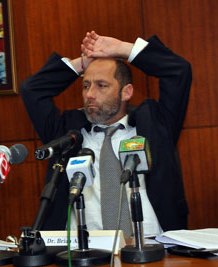“An IMF team conducting its first quarterly assessment has determined that Sri Lanka is meeting the targets of the July IMF standby agreement, and it appears that the IMF staff will recommend release of the second tranche of IMF funds in October. The IMF agreement, combined with optimism from the end of Sri Lanka,s conflict and an improving external economic environment, has encouraged substantial inflows of foreign capital into Sri Lanka. Although the road forward will be challenging, the IMF believes that Sri Lanka is on track to build international foreign reserves, control expenditure, increase government revenue, and reform the banking sector. The IMF will establish an office housed in the Sri Lankan Central Bank to monitor compliance. Overall, the IMF seems more optimistic than several local economists.”the US Embassy Colombo informed Washington.
The Colombo Telegraph found the related leaked cable from the WikiLeaks database. The unclassified cable recounts the details of the first quarterly review conducted by the IMF re Sri Lanka’s progress toward IMF goals.The cable was written on September 23, 2009 by the US Ambassador to Colombo, Patricia A. Butenis.
Ambassador Butenis wrote; “The most difficult challenge will be to increase revenue so that Sri Lanka escapes from chronic balance of payments crisis. Government revenue fell by an estimated 6% in the first half of 2009, reflecting declining imports (GSL derives a key segment of its revenue from import duties) and a weak domestic economy. The GSL has targeted increasing its revenue by 2% of GDP by 2011, starting from the 14.9% collected in 2008. Aitken was optimist that the GSL is ready to make fundamental reforms to increase revenue, and he noted that Sri Lanka has already increased its “nation building tax” from 1.5 to 3%. Sri Lanka will also benefit from increased revenues as the economy improves and imports increase. GSL has a Presidential Commission to examine ways to increase revenue, focusing on widening the taxpayer base rather than increasing tax rates. Currently there are only 650,000 taxpayers (out of a total 20 million population) but the GSL to start collecting from 1 million taxpayers by 2010.”
“The GSL could meet its IMF target for two key state owned enterprises (SOE) to break even financially by 2011. The Ceylon Petroleum Company (CPC) and Ceylon Electricity Board (CEB) chronically lose money, but the IMF team thought that the GSL has fully committed to reforming these SOEs to stop the drain on government finances. The CPC has benefited from falling international oil prices, while they have kept domestic retail oil prices high. Similarly, the CEB is building a coal fired electricity plant, so they could benefit from moving from high cost oil to cheaper coal. It is not clear that the GSL has planned real reforms of either SOE.” she further wrote.
Placing a comment Butenis wrote; Econoff was surprised by the IMF,s optimistic assessment. Although clearly the GSL has built up its reserves, and private capital is flowing into portfolio investments, many economists and businessmen are skeptical that the GSL will be able to continue to meet its spending and revenue targets. The GSL plans to call Presidential and Parliamentary elections over the next six months, which could lead to excessive spending.”


No comments:
Post a Comment